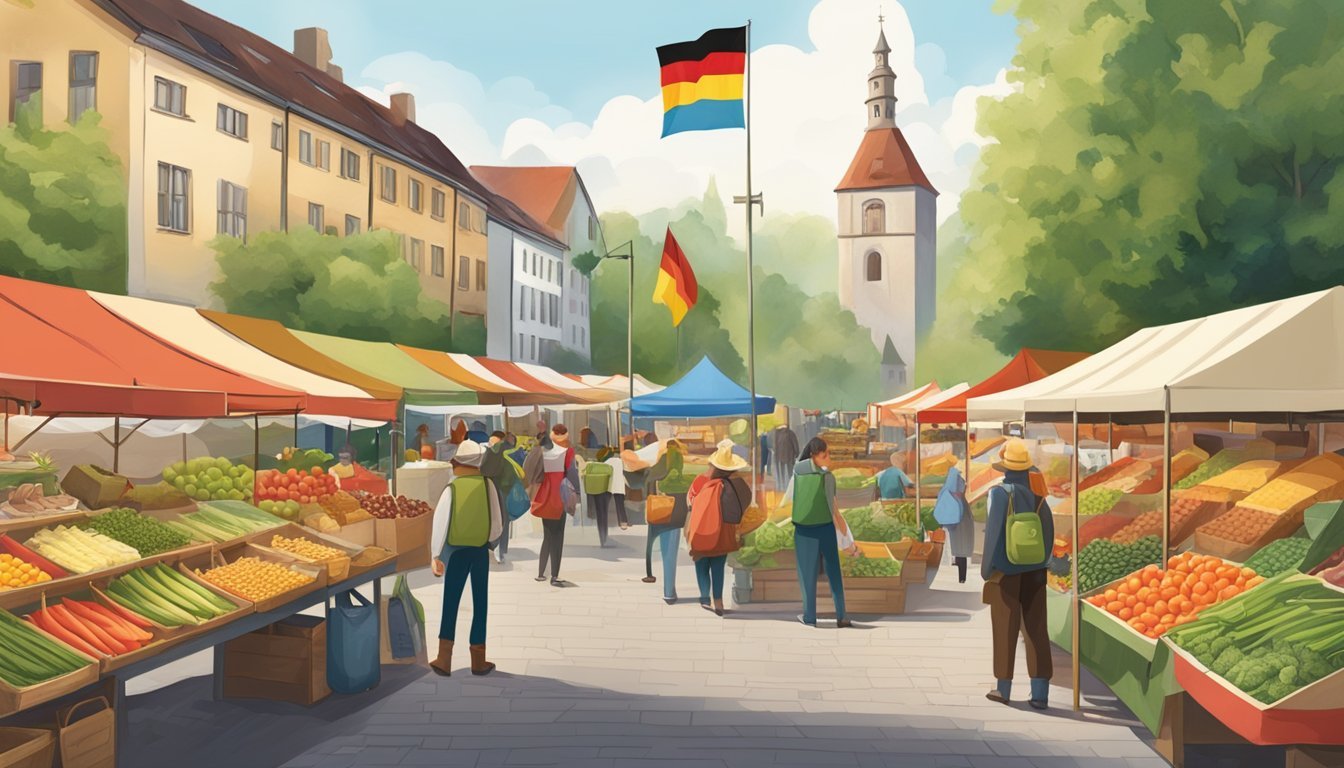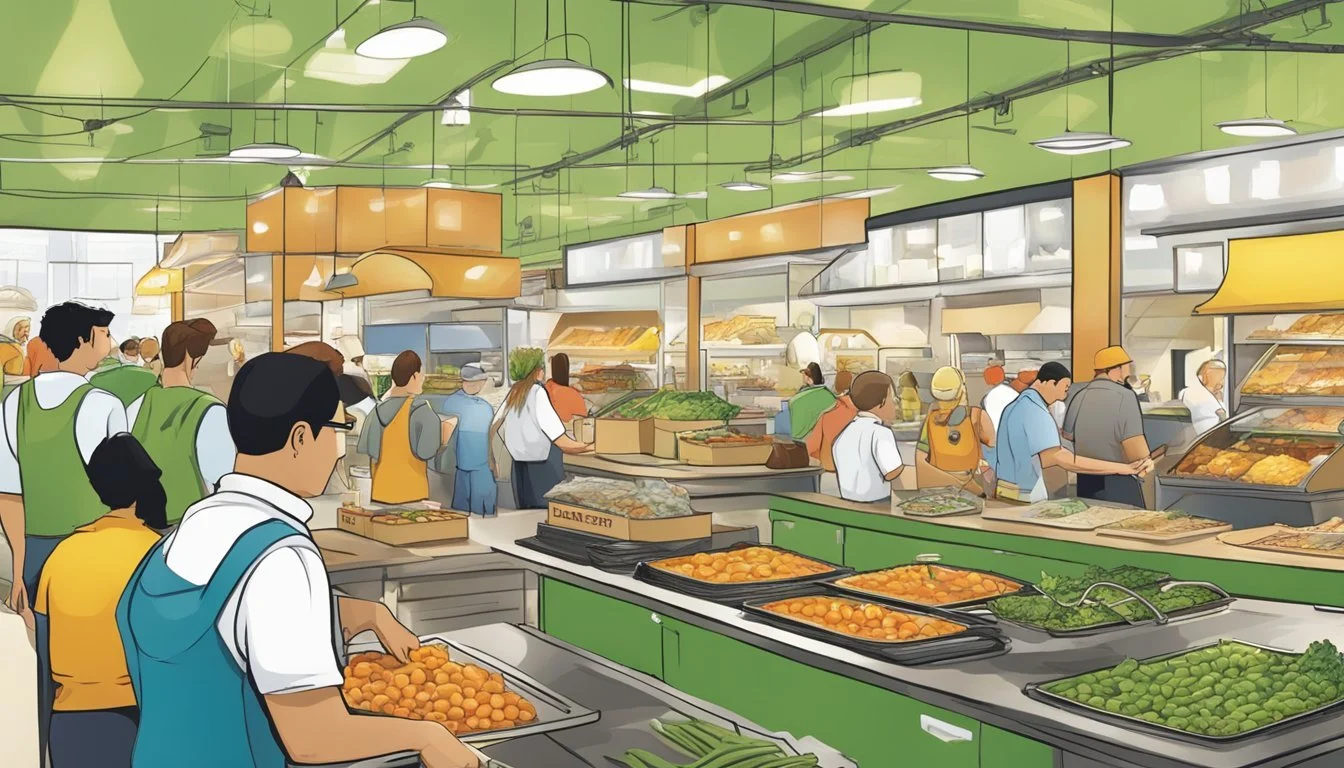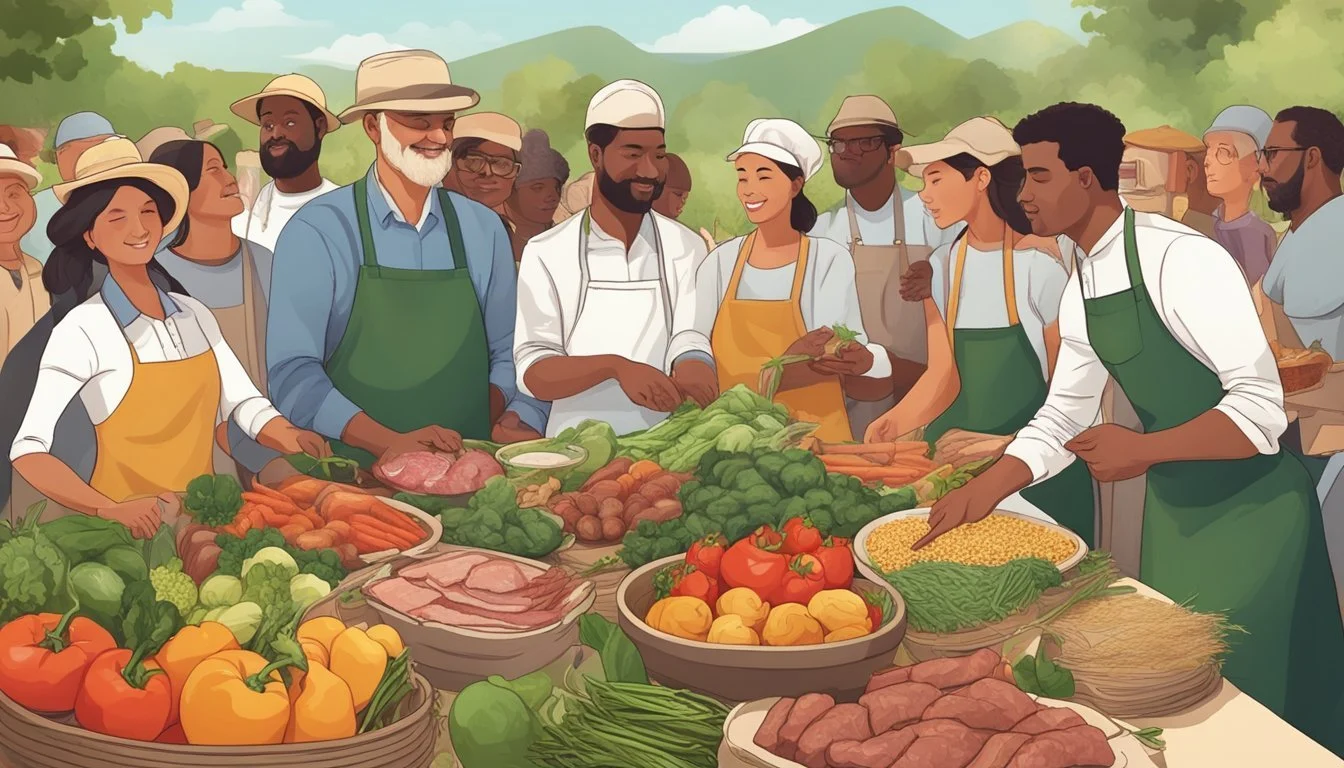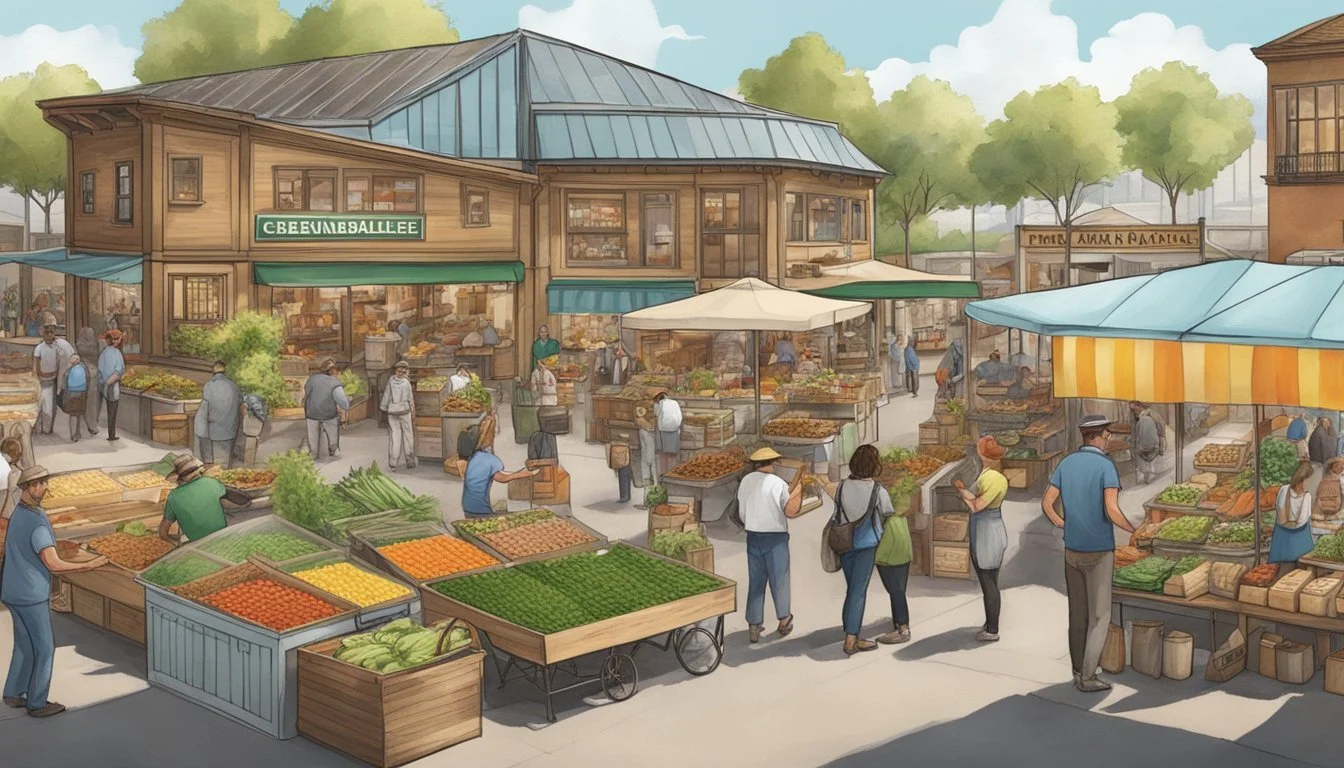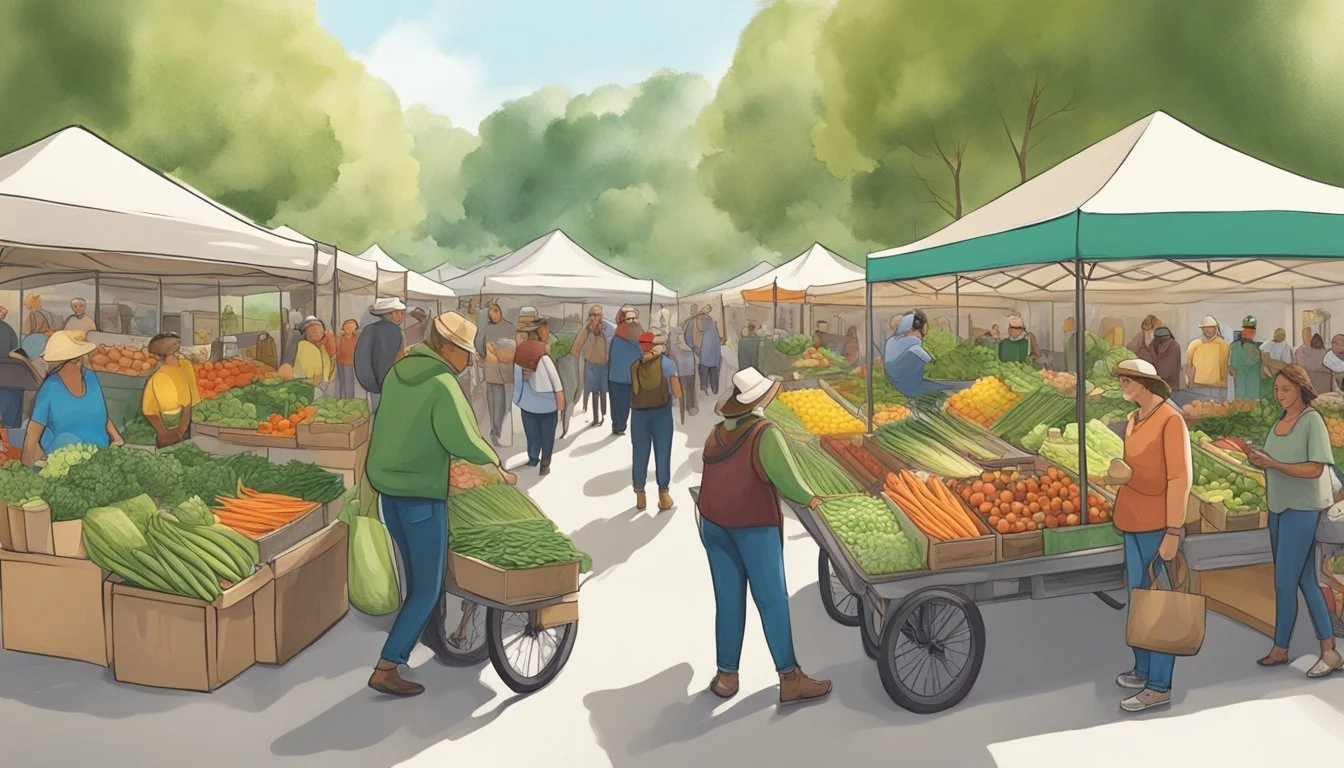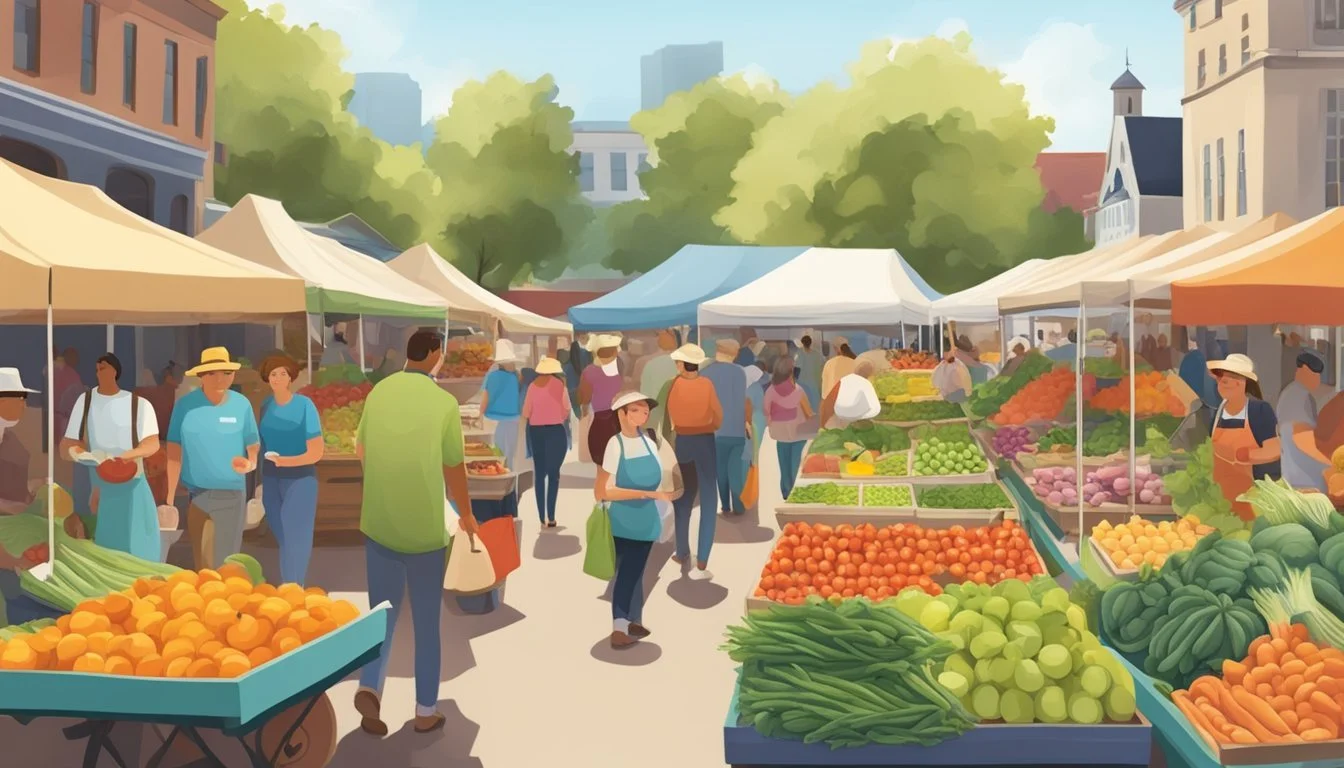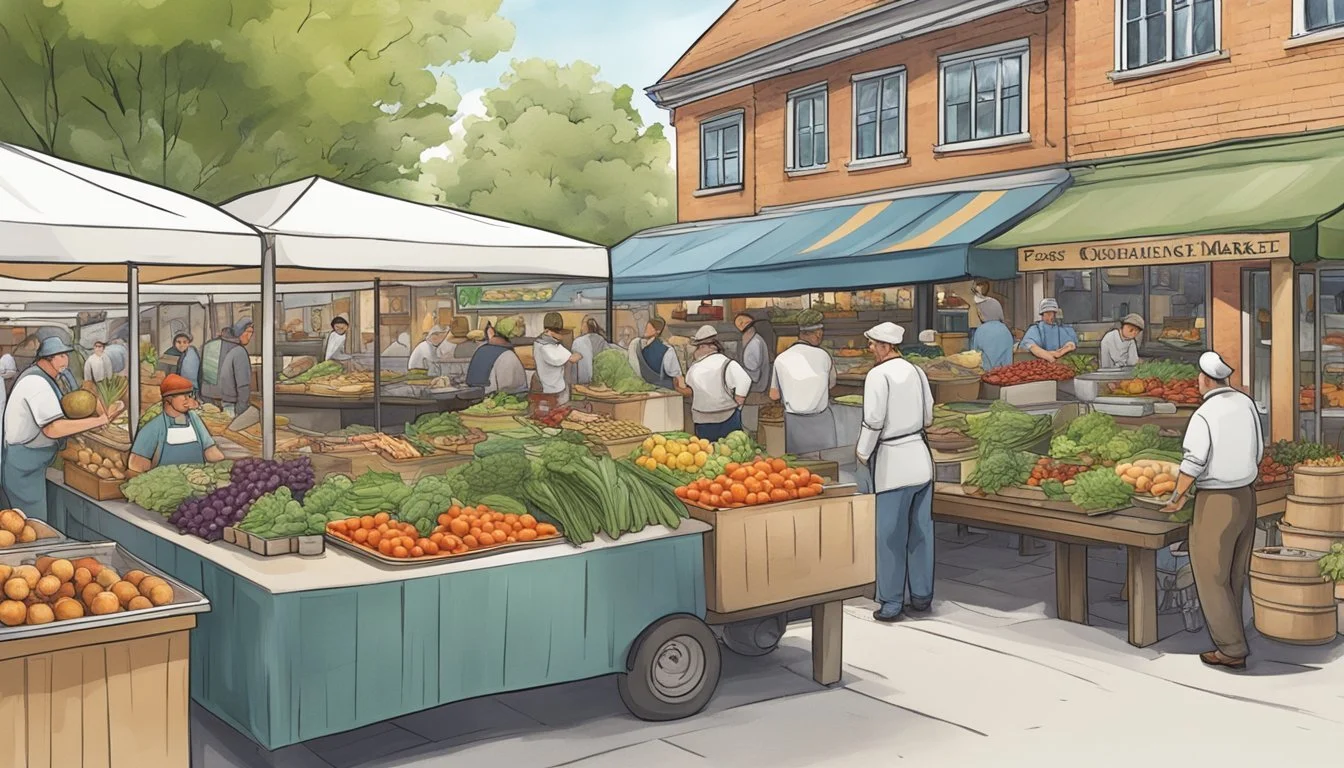German Texan Food and Sustainability Initiatives
Pioneering Local Cuisine with an Eco-Conscious Twist
Pioneering the integration of cultural heritage into contemporary sustainability efforts, German Texan communities balance a deep-rooted appreciation for traditional cuisine with innovative environmental initiatives. The culinary landscape of these communities celebrates a rich tapestry of flavors, showcasing dishes that reflect a fusion of German heritage with Texan influences. Bratwurst, schnitzel, and strudel meet Texan barbecue, with adaptations that reflect local tastes and ingredients. This amalgamation of gastronomy not only preserves the historical narrative of German settlers but also prompts a culinary evolution that remains dynamic and responsive to the modern palate.
Sustainability initiatives are at the forefront of Germany's global strategy, as they actively seek to tie in environmental consciousness with nutritional well-being. Reflective of this ethos, German Texans have begun to adopt practices that emphasize the importance of sustainable food systems. Initiatives such as the sourcing of local produce, the promotion of plant-based diets, and the reduction of food waste are increasingly prominent within the community. These practices not only enhance the quality and sustainability of German Texan food but also mark a committed step towards Germany's broader objective of achieving food security and adhering to the 2030 Agenda for Sustainable Development.
Aided by national strategies and local dedication, the integration of sustainability into the culinary identity of German Texans is an ongoing process. Policies and concept papers, like those proposed by Federal Minister Cem Özdemir, lay the groundwork for a transformation that values environmental stewardship as much as culinary heritage. This dovetailing of tradition with innovation crafts a sustainable future where food serves as a bridge between cultures and a platform for ecological responsibility.
Historical Context of German Texan Cuisine
The influence of German settlers on Texan food is evident in the state's culinary diversity, with a particular emphasis on robust flavors and hearty meals. This secton explores the origins of German Texan cuisine and its evolution over time, emphasizing changes in nutrition and dietary habits.
German Influence on Texan Food
German immigration to Texas began in the early 19th century, bringing a rich food culture that emphasized meats, especially sausages, breads, and beer. Key German contributions to Texan cuisine include:
Sausages: Varieties such as bratwurst became staples in Texas, integrating local spices and cooking methods.
Bread: Rye and sourdough breads, often accompanying sausages or used for sandwiches.
Beer: The introduction of German brewing techniques led to the establishment of Texas breweries.
This culinary infusion from Germany shaped local dietary habits, with a focus on proteins and complex carbohydrates that provided the necessary nutrition to support physically demanding lifestyles.
Evolution of Food Practices
Over time, German Texan food practices adapted to incorporate local ingredients and preferences, leading to a unique, hybrid cuisine. Key changes include:
Local Flavors: The integration of Texan spices and ingredients, such as jalapeños and barbecue techniques.
Nutritional Shifts: Modernization brought a broader focus on nutrition, with a gradual inclusion of more vegetables and lean proteins into traditionally meat-heavy German Texan diets.
Sustainability: Recent trends emphasize the importance of sustainable food practices, including locally sourced ingredients and environmentally friendly farming methods.
The historical context of German Texan cuisine reflects both a preservation of tradition and a continuous adaptation, ensuring its relevance to contemporary tastes and dietary requirements.
Current State of Sustainability in Germany
Germany's commitment to sustainability is deeply embedded in its federal policies and executed with the active participation of municipalities and civil society. The nation's approach interconnects environmental, economic, and social objectives to ensure long-lasting and inclusive progress.
Federal Sustainability Policy
The Federal Government of Germany has established a comprehensive sustainability policy, primarily guided by the German Sustainable Development Strategy. This strategy is anchored in concrete goals aligned with the indicators of the United Nations' Sustainable Development Goals (SDGs). The Federal Ministry of Food and Agriculture plays a crucial role in shaping and applying these policies to ensure the food sector’s growth is both sustainable and responsible.
Recent updates to the German Sustainable Development Strategy:
Date of Approval: March 10, 2021
Key Update: Inclusion of the 17 SDGs, expanding the strategy’s scope
Published by: Federal Cabinet
The Bund (federal government) has made strides in enhancing the strategy to make it more systematic and focused, particularly on post-2030 targets. This level of federal commitment showcases Germany’s determination in steering the nation towards a more sustainable future.
Role of Municipalities and Civil Society
The contribution of municipalities and civil society in Germany is significant. They localize the broad sustainability goals set by the federal government and transform them into actionable community and city-level initiatives.
Municipalities are tasked with:
Implementing sustainability projects such as community gardens and renewable energy plants
Encouraging local businesses to adopt sustainable practices
Civil society groups complement these efforts by:
Advocating for transparency and the inclusion of citizen voices in sustainability policymaking
Conducting educational programs to raise public awareness on sustainability issues
Collectively, these entities mobilize a bottom-up approach to sustainability, ensuring that Federal goals resonate within local communities and lead to effective and tangible change.
Sustainable Food Systems and Agriculture
In Germany, efforts to create sustainable food systems and agriculture are characterized by measures aimed at enhancing resilience, promoting organic practices, and supporting small farms. These initiatives form an essential component of the country's larger goal to develop sustainable development within the food system.
Agricultural Sustainability Measures
German agricultural policy increasingly emphasizes the adoption of sustainable practices to maintain the health of the environment and ensure long-term productivity. Actions include:
Resource Management: Efficient use of water and energy, preservation of soil quality, and biodiversity protection.
Climate Adaptation: Development of crop varieties resistant to climate change effects, bolstering soil's ability to manage extreme weather events.
Integration of Sustainable Food Production
The integration of sustainability into the entire food production chain is crucial for the transformation of food systems. This includes:
Supply Chain Efforts: Collaboration among farmers, processors, retailers, and consumers to reduce waste and energy consumption.
Policy Frameworks: The Farm to Fork Strategy by the EU, which attempts to unify human, animal, plant, and environmental health aims into a cohesive policy directive.
Organic Farming and Small Farms
Organic farming and the viability of small farms are at the heart of Germany's sustainable agriculture:
Organic Products: Promotion of organic farming to reduce chemical usage and foster soil health.
Support for Small Farms: Incentives and programs designed to assist small farms in adopting sustainable practices, thus securing their place within the food system.
Green Initiatives and Environmental Impact
German Texan culinary establishments are recognizing the critical role they play in sustainability and the fight against climate change. They are adopting measures to address energy consumption and emissions while taking steps to preserve biodiversity and manage ecosystems effectively.
Energy Consumption and Greenhouse Gas Emissions
The food industry in Germany, including the Texan niche, has taken significant strides to reduce energy consumption and greenhouse gas emissions. Many restaurants and food producers are transitioning towards renewable energy sources, such as solar and wind power, to mitigate their environmental impact.
Renewable Energy Use: Shift to green energy sources for cooking, refrigeration, and ambience.
Efficiency Practices: Implementation of energy-efficient appliances and reduction of food waste.
These steps not only align with Germany’s sustainability goals but also resonate with the global efforts to combat climate change by reducing the carbon footprint of the food sector.
Biodiversity and Ecosystem Management
Protecting biodiversity and managing ecosystems sustainably are at the core of German Texan food providers' environmental initiatives. They focus on sourcing local and organic ingredients that promote healthier soil and support local wildlife.
Local Sourcing: Encourages preservation of regional plant varieties and animal breeds.
Organic Farming: Minimizes the use of synthetic pesticides and fertilizers, fostering a more natural ecosystem balance.
Through these practices, the food industry contributes to maintaining biodiversity and taking proactive climate action, ensuring the long-term viability of the environment they depend on for ingredients.
Game-Changing Innovations in Food Industry
In the realm of sustainability, the German Texan food industry embraces innovation, with a strong shift toward plant-based options and enhancements to the food supply chain.
Plant-Based Foods and Consumer Choices
The food industry has seen a transformative trend with the emergence of plant-based foods. This shift aligns with increasing consumer demand for alternatives that are perceived as more environmentally friendly and offer nutritional benefits. German Texan cuisine, traditionally rich in meat dishes, now includes plant-based alternatives that cater to health-conscious consumers while reducing the environmental impact.
Consumer Protection and Transparency: Food producers are investing in making food sourcing and processing more transparent, thus ensuring consumer protection and fostering trust.
Innovative Plant-Based Products: Entrepreneurs in the region are introducing a variety of plant-based meats and dairy products, crafted to mimic traditional flavors.
Innovative Ideas in Sustainable Food Supply
The sustainable food supply is driven by initiatives to enhance the resilience of agricultural systems and food distribution networks.
Sustainable Practices: Incorporating regenerative agricultural practices helps in preserving soil quality and promoting biodiversity.
Focus on soil health
Crop rotation and cover cropping
Technological Enhancements: Advances in technology contribute to improved yield and reduced greenhouse gas emissions. For example:
Precision farming tools
Supply chain monitoring software
These innovations are vital in meeting the dual challenges of food security and environmental stewardship, ensuring the German Texan food industry remains sustainable and productive.
Food Security and Nutrition
In recognizing the importance of sustainable nutrition and addressing food security challenges, the section delves into Germany's efforts and objectives to ensure a robust, resilient food system.
Targets for Sustainable Nutrition
Germany has been proactive in establishing targets for sustainable nutrition with commitments that align with the international 2030 Agenda for Sustainable Development. The country aims to end hunger and achieve food security, focusing on sustainable agricultural and food systems. The German Federal Government's Food and Nutrition Strategy, expected to be finalized by 2023, underscores the imperative to support diverse and balanced diets. It prioritizes:
Availability: Ensuring a year-round supply of diverse and healthy food.
Nutrition Education: Advancing knowledge on balanced diets, especially among key demographics such as women and small children.
Challenges in Food Security
The challenges in maintaining food security are multifaceted. Germany faces issues similar to other global entities, including:
Sustainable Food Consumption: There's a need to balance the demand for food with sustainable production, considering the impacts of climate change and resource scarcity.
Obesity and Dietary Habits: Modern dietary patterns often lead to obesity and non-communicable diseases, highlighting the need for a shift towards healthier eating practices.
Addressing these challenges is critical for establishing resilience to food crises and promoting sustainable, healthy living across populations.
Educational and Institutional Initiatives
In addressing the nexus between German Texan food and sustainability, educational institutions and healthcare facilities have emerged as pivotal platforms for driving sustainable eating practices.
Schools and Universities as Change Actors
Educational environments serve as incubators for sustainability, where both ideology and practice of sustainable eating can take root. In Texas, with its rich German heritage, schools and universities have adapted by integrating sustainable eating into their curricula and dining services. They have become exemplary settings, displaying how educational institutions act as catalysts in promoting and implementing sustainable food systems.
Curricula Integration: Courses on sustainable agriculture and environmental studies emphasize the importance of sustainable eating habits.
Cafeteria Initiatives: University canteens often source locally produced, seasonal food that reflects German Texan culinary traditions while reducing environmental impact.
Hospitals and Canteens Promoting Sustainability
Hospitals in Texas with German influences also contribute to the sustainability movement by implementing changes in their canteens and food services. By doing so, they promote health not only through medical services but also by offering nutritious and sustainable meal options.
Sustainable Menus: Hospital canteens strive to craft menus that incorporate local and seasonal produce, reducing carbon footprints and supporting local farmers.
Education for Patients and Staff: Hospitals offer programs to educate about the benefits of sustainable eating, making them active actors in spreading sustainability awareness within the community.
Public Policy and Regulatory Framework
Germany has enacted several policies and regulations to promote sustainable food practices, guided by the objectives to protect the environment and improve public health. A central focus is the alignment with national goals for climate action and integrating global sustainability targets.
Federal and State Government Guidelines
The German Federal Government, guided by Federal Minister Cem Özdemir, has taken decisive steps toward enhancing the sustainability of food consumption and production. A strategic approach laid down in the Food and Nutrition Strategy aims to not only improve the health of citizens but also reduce the environmental footprint of the food system. At the state level, these guidelines dictate that the federal states (Bundesländer) implement policies considering their specific regional needs, supporting the overall aim of sustainability and climate action.
Key actions include:
Legislating for reduced greenhouse gas emissions in agriculture.
Encouraging local and seasonal food production and consumption.
Developing educational programs for healthier and more sustainable diets.
These initiatives are part of a broader framework contributed to by both the federal government and the state governments, aiming to achieve a cohesive and comprehensive approach to sustainable food policy.
United Nations and Global Sustainability Goals
Germany's policy framework operates within a larger context of global efforts, aligning strongly with the United Nations Sustainable Development Goals (SDGs). The country collaborates with international organizations to support a global shift toward sustainable food systems.
Alignment with UN SDGs:
Goal 2: End hunger through sustainable food production and improved nutrition.
Goal 12: Ensure sustainable consumption and production patterns.
Goal 13: Take urgent action to combat climate change and its impacts.
The federal cabinet of Germany works to integrate these goals into national sustainability strategies, demonstrating a commitment to global agreements on climate action and environmental stewardship.
Social Movements and Community Action
In response to global sustainability challenges, German Texan communities are leveraging social movements and community action to promote sustainable food practices, emphasizing the rich cultural heritage intertwined with modern environmental concerns.
Civil Society and Grassroots Initiatives
German Texan civil society is characterized by a diverse array of grassroots initiatives that actively work towards creating sustainable and locally responsive food systems. These groups often operate through farmers' markets and community-supported agriculture (CSA) programs, which provide fresh, locally sourced products to consumers while preserving German Texan culinary traditions. Efforts such as urban gardening and the preservation of heirloom crop varieties are testaments to their commitment to sustainability.
These organizations also play a crucial role in advocating for policy changes that support sustainable agricultural practices. They emphasize the importance of:
Local production: Reducing the reliance on long-distance food transport.
Agroecology: Employing farming methods that harmonize with natural ecosystems.
Food sovereignty: Ensuring communities have the right to shape their own food systems.
Role of Media in Shaping Public Opinion
Social media platforms have emerged as powerful tools for German Texan food sustainability initiatives to share information, build community awareness, and mobilize support around their causes. They create narratives that highlight the importance of sustainable practices and the risks of inaction, thus influencing public opinion in the following ways:
Educating the public: Dissemination of information regarding sustainable food practices and the significance of food choices on the environment.
Campaigning: Utilizing digital platforms to amplify messages related to policy advocacy and community projects.
By leveraging the connectivity of social media, these movements can transcend geographical boundaries and encourage a broader participation in sustainability efforts, fostering a collaborative network among like-minded individuals and groups.
Practical Aspects of Sustainability
Sustainable practices in German Texan food emphasize minimizing food waste and managing resources wisely while adhering to high standards of animal welfare and ethical production.
Reduction of Food Waste and Resource Management
In the realm of German Texan cuisine, a critical aspect of sustainability involves the reduction of food waste and efficient resource management. Initiatives focus on repurposing leftovers, contributing to a circular food economy. For instance, stale bread often finds new life in traditional recipes like bread pudding or savory bread salads, thereby minimizing waste.
Food Waste: Strategies to reduce food waste include portion control, improved storage techniques, and promoting consumer awareness through education.
Water Usage: Water is conserved by implementing drip irrigation in agriculture and reusing water when safe and possible.
Reducing greenhouse gases also plays a significant role, with many restaurants and suppliers striving to lower their carbon footprint through sustainable practices.
Animal Welfare and Ethical Food Production
Animal welfare is paramount in sustainable German Texan food production. Ethical practices ensure animals are raised in humane conditions, which, incidentally, also leads to higher quality food products.
Animal Housing: Environments are designed to mimic natural habitat with ample space and access to the outdoors.
Feed and Nutrition: Livestock are provided with nutritious, non-GMO feed, without unnecessary antibiotics or hormones.
These practices not only respect the dignity of farm animals but also result in a significant decrease in agriculture-related emissions. By prioritizing sustainable food production methods, German Texan communities make a conscientious effort to reduce carbon emissions and promote a better food system.
Future Directions and Transformation Process
The transformation of the German Texan food system is poised to leverage sustainability initiatives, aligning with the broader EU goals of a sustainable future. Through comprehensive planning and alliance between policymakers and academicians, it aims at charting a resilient path forward.
Setting a Roadmap for Sustainable Development
The German Texan community is embarking on a strategic transformation process, with sustainability at its core. Policymakers have delineated a food strategy focusing on sustainable agriculture practices, healthy nutrition, and environmental stewardship. They strive to contribute to the EU’s Sustainable Development Goals and set benchmarks for responsible production and consumption. The roadmap incorporates science-based targets to mitigate the impact of food systems on the climate, promoting a shift towards a greener economy.
Collaboration Between Politicians and Researchers
The transformation process necessitates a strong collaboration between politicians and researchers to effectively intertwire scientific insight with public policy. Researchers in Germany are working in tandem with politicians to develop and implement evidence-based strategies that address the unique needs of the German Texan food landscape. This union aims to harness scientific advancements and translate them into practical, policy-driven solutions, ensuring the food strategy adapts to future challenges and opportunities.



